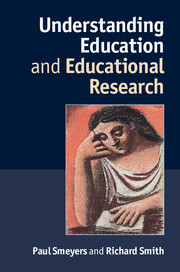Book contents
- Frontmatter
- Contents
- Acknowledgements
- Introduction
- 1 Education and its research
- 2 The nature of social science
- 3 The idea of method
- 4 The nature of philosophy
- 5 The art of research
- 6 Language, truth and meaning
- 7 On the dominant nature of educational research and its shortcomings
- 8 Research, policy and practical reasoning
- 9 The limits of measurement
- 10 Parenting and government intervention in the family (case study I)
- 11 Researching happiness and well-being (case study II)
- 12 Philosophy and research
- Notes
- References
- Index
5 - The art of research
Published online by Cambridge University Press: 05 November 2014
- Frontmatter
- Contents
- Acknowledgements
- Introduction
- 1 Education and its research
- 2 The nature of social science
- 3 The idea of method
- 4 The nature of philosophy
- 5 The art of research
- 6 Language, truth and meaning
- 7 On the dominant nature of educational research and its shortcomings
- 8 Research, policy and practical reasoning
- 9 The limits of measurement
- 10 Parenting and government intervention in the family (case study I)
- 11 Researching happiness and well-being (case study II)
- 12 Philosophy and research
- Notes
- References
- Index
Summary
Question: Which is more precise: Henry James, in his ability to describe how a person’s action flows from his or her motivations, or a particle accelerator, in its ability to depict the causal interactions of subatomic particles?
… the question … [is] ridiculous. There is no single scale on which one can place both Henry James and a particle accelerator to determine which is more precise. Within the realm of human motivation and its effects, The Portrait of a Lady is more precise than a Peanuts cartoon; within the realm of measuring atomic movements, some instruments are more precise than others.
(Lear, 1998: 24–25)Introduction
In this chapter we argue that sound knowledge, or secure understanding, are to be thought of as what we can place confidence in; or, to put it slightly differently, as what commands rational assent or the assent of reasonable people. The expectation that educational research should be ‘scientific’, precise and preferably conducted through measurement and quantification largely reflects the fact that in our own time, as for several hundred years, it is science and scientific knowledge that have characteristically come to appear especially confidence-worthy, for the historical reasons that we set out in Chapter 3. To call a claim ‘scientific’ or ‘scientifically proved’ is to make a short-cut, asserting that it meets the demanding standards set by scientists, and physical scientists in particular. That of course is how appeals to the credentials of science can often operate as little more than a species of rhetoric, as is familiar from the kind of advertisement that claims that a deodorant is ‘scientifically’ proven to last for a whole day or that ‘scientists have demonstrated’ that a dietary product will lower your weight (pictures of laboratory scientists in white coats may appear in the advertisement in order to add conviction). The purpose of this chapter is to show that the standards of science are not the only sound standards; that knowledge or understanding, and thus educational research, can have other criteria, other claims on our assent. We start from an example that is particularly interesting in this respect: that of evolution. Has evolution – the ‘theory’ of evolution as it is often called – established itself as scientific fact, or does it have some other basis for its claim to be taken seriously?
- Type
- Chapter
- Information
- Understanding Education and Educational Research , pp. 77 - 94Publisher: Cambridge University PressPrint publication year: 2014



